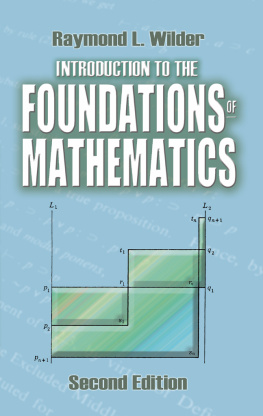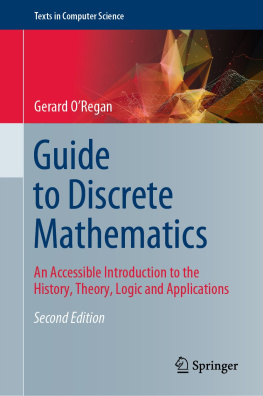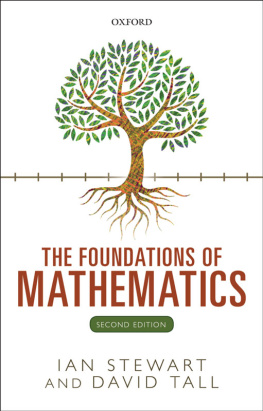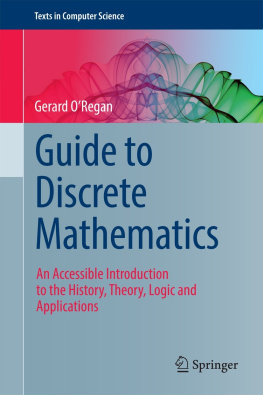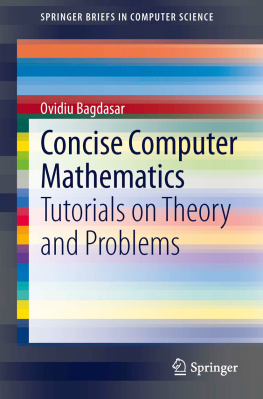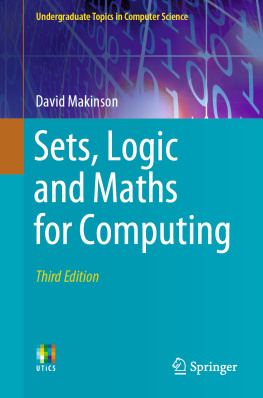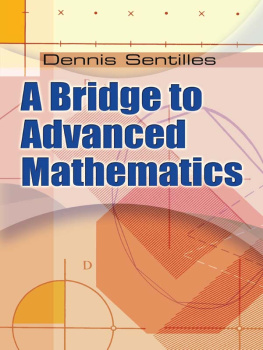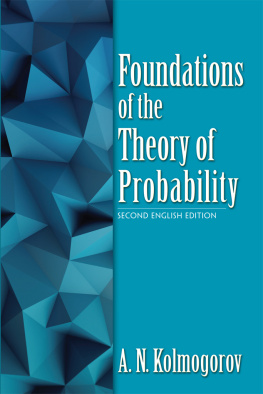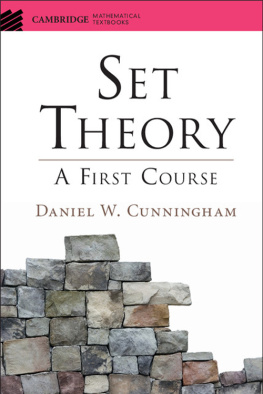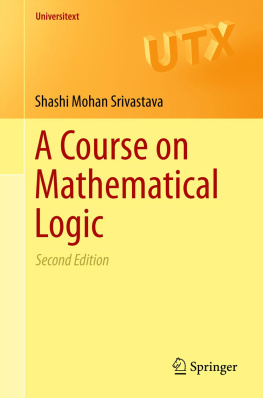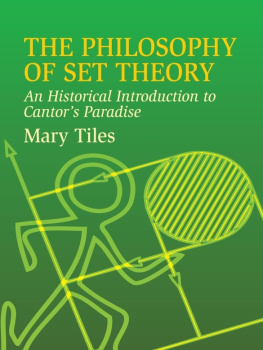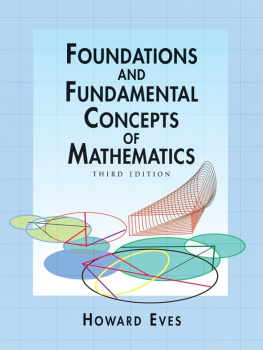INTRODUCTION TO
The Foundations
of Mathematics
SECOND EDTION
RAYMOND L. WILDER
Dover Publications, Inc.
Mineola, New York
Copyright
Copyright 1952, 1965 by The Estate of Raymond L. Wilder
All rights reserved.
Bibliographical Note
This Dover edition, first published in 2012, is an unabridged republication of the 1983 printing of the work originally published in 1965 by John Wiley & Sons, Inc., New York. The First Edition was published by Wiley in 1952.
Library of Congress Cataloging-in-Publication Data
Wilder, Raymond Louis, 18961982.
Introduction to the foundations of mathematics : second edition / Raymond L. Wilder.
p. cm.
This Dover edition, first published in 2012, is an unabridged republication of the 1983 printing of the work originally published in 1965 by John Wiley & Sons, Inc., New York. The first edition was published by Wiley in 1952.
Includes bibliographical references and index.
eISBN-13: 978-0-486-27620-5
1. MathematicsPhilosophy. 2. Logic, Symbolic and mathematical. I. Title.
QA9.W58 2012
510dc23
2011052467
Manufactured in the United States by Courier Corporation
48820901
www.doverpublications.com
PREFACE
to Reprint Edition
Although this reprint is not a revision, properly speaking, typographical errors have been corrected, and additional bibliography provided. In addition, some notes have been added to familiarize the reader with events that have taken place since the 1965 edition was prepared.
I am indebted, as I assume are those who have tried in vain to obtain a copy, to Mr. Robert E. Krieger for bringing out this improved reprint. Scarcely a month goes by that I do not receive inquires asking where a copy might be obtained. Most of the material in the book is not dated and I presume that with new sets of problems the book could be called revised; but under the circumstances, I prefer to leave this aspectprovision of new problemsto the imagination and ingenuity of both teachers and students.
R. L. WILDER
Santa Barbara
Preface
In making this revision, it has been my purpose to improve the exposition, correct those errors that appear inevitable in a first edition, and augment both text and problems with material that will better achieve the original objectives of the book. Otherwise, the general plan of presentation has not been altered.
Among the changes or additions are new material on definition and completeness and independence of undefined terms in .
Regarding the general intent of the book, there has been misunderstanding on the part of some readers. I wish, therefore, to emphasize that its purpose is twofold: (1) to acquaint the student, mathematical major or not, with the origin and nature of fundamental concepts of modern mathematics; and (2) to show how it became natural, and necessary, to inquire more deeply (using such tools as the axiomatic method, logical formalism, etc.) into the implications and dangers of the unrestricted use of what seem natural, necessary, or intuitively justified concepts (such as set theory, classical logic, etc.). It was by no means my intention to present a formal treatment, logically developed via theorem and proof, of axiomatic set theory or logical formalism, for example, as of the year 1965. Excellent books of the latter nature have been written during the past twelve years, and it is my hope that the student whose curiosity has been sufficiently aroused by the present book will be stimulated to read some of these more technical treatises.
For example, I have been asked if it is not an error when, after discussing the axiomatic method in ; he is ordinarily not interested in what principles he can base them upon (in the axiomatic sense). For him, set theory is an important method, not a theory. And after a student becomes acquainted with the method, he may well be motivated to investigate its validity. In this respect, it is something like logic. Despite the long time that the working mathematician has used logic, he has evinced little interest in studying it for its own sake. I am still not convinced that the axiomatic framework provides the proper introduction to set theory for the average mathematician; any more than I am of the opinion that he should be introduced to logic through logical formalism.
Similar remarks can be made about the treatment of cardinal numbers in . The natural (naive) approach is first taken, during the course of which the characterizing features (such as separability and continuity in the case of the real number continuum) are discovered and made available for axiomatic formulation. I suppose I might formulate my philosophy regarding this order of presentation by stating that I believe the student should get the why as well as the what. I believe that it is this philosophy which has motivated much of the new curriculum for the elementary schools; traditionally the what was considered all that was necessarythe student was given to understand that this is it, and you can take it or leave it. And in a tragic number of cases he was doing the latter. To present, in axiomatic form, the finished products of research into basic concepts, while providing no explanation of their genesis and evolution, comes dangerously close to providing only the what.
For those who wanted me to go more deeply into mathematical logic, material that is relevant to the major purposes of the book has been added. To provide more than this would necessitate giving up the idea that the book is essentially designed for a one-semester course. However, in the bibliography the reader will find references to recent texts on logic, axiomatic set theory, etc., which should form entirely satisfactory sequels to the material given herein.
For encouragement and advice (not always heeded) during the process of revision, I wish to thank Professors J. Bennett, F. Harary, and K. May, as well as many students who must go unnamed. To my publisher, John Wiley and Sons, and especially Cecil Yorke, Staff Editor in the Production Division, I wish to express thanks for permitting this second edition and for expert guidance during its production.
R. L. WILDER
Ann Arbor, Michigan
March, 1965
Preface to First Edition
This book grew out of a course in Foundations of Mathematics which I have given at the University of Michigan for over twenty years. The reason for instituting the course was simply the conviction that it was not good to have teachers, actuaries, statisticians, and others who had specialized in undergraduate mathematics, and who were to base their lifes work on mathematics, leave the university without some knowledge of modern mathematics and its foundations. The training of these people consisted chiefly of classical mathematics and its applicationsthat part of mathematics which is based on pre-twentieth-century and, in large part, on pre-Cantorian ideas and methods.
It seemed, too, that a course in Foundations at about the senior level might serve to unify and extend the material covered in the traditional mathematics curriculum. The compartmentalization of the preparatory schoolarithmetic, algebra, and geometryis usually continued in college with a further dose of algebra, followed by courses in analytic geometry and calculus in which a little unification of preceding subjects takes place, but no time is spent on the nature of the material or its foundation.
Also, the growing realization that mathematical logic is a new and legitimate part of mathematics made it seem advisable to institute a course which would make manifest the importance of studies in the Foundations, and the reasons for inquiring into the nature of mathematics by either the tools of logic or other methods.

